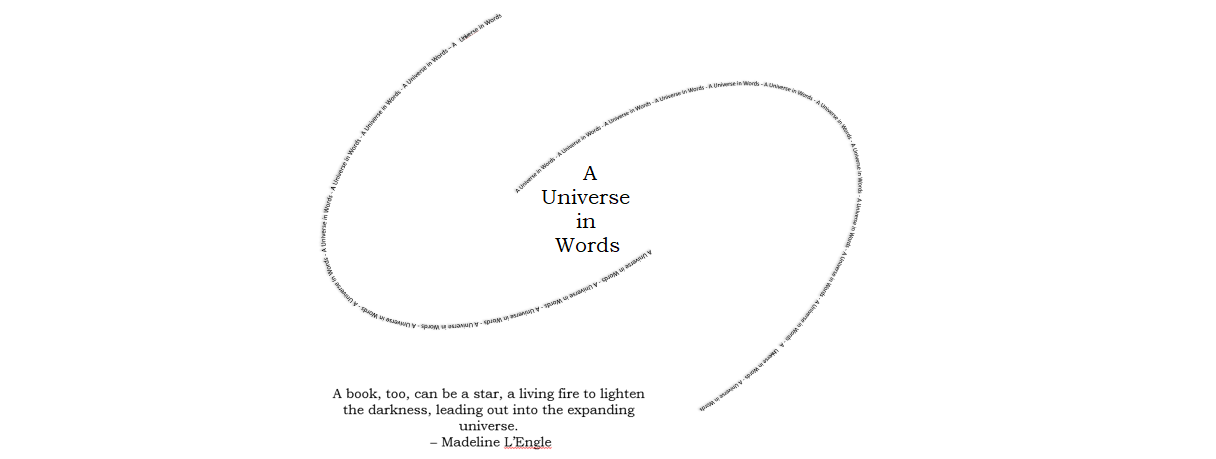Sounds and Poetry - 'Meeting at Night' by Robert Browning
 One of my modules this term is Literary Linguistics, which looks at how stylistics help create the meaning of a text. Often you don't recognize it while you read, but the way the text is written is almost more important than what is written, in order to bring information or sentiment across. We write shopping lists in bullet points rather than a paragraph because we need clarity in order to single out each point. Similarly, if something is written in a list in a novel, that means each item is important and requires attention. As a wannabe-writer, I think this is fascinating because it relates to the subconscious reading process that the writer can influence.
One of my modules this term is Literary Linguistics, which looks at how stylistics help create the meaning of a text. Often you don't recognize it while you read, but the way the text is written is almost more important than what is written, in order to bring information or sentiment across. We write shopping lists in bullet points rather than a paragraph because we need clarity in order to single out each point. Similarly, if something is written in a list in a novel, that means each item is important and requires attention. As a wannabe-writer, I think this is fascinating because it relates to the subconscious reading process that the writer can influence.In our first seminar, we talked about sounds in poems that help to foreground certain imagery and ideas. The poem we used was Robert Browning's Meeting at Night. The first of two stanzas is below:
The grey sea and the long black land;And the yellow half-moon large and low;And the startled little waves that leapIn fiery ringlets from their sleep,As I gain the cove with pushing prow,And quench its speed i' the slushy sand.The first thing to notice here is the rhyming scheme, a-b-c-c-b-a, which almost creates a kind of ripple effect from the centre of the poem, similar to the 'little waves that leap' up. When trying to focus on the sounds it is of course very important to read it out loud, which can be weird when you're in public but is always useful, I feel. When reading it out loud, a pattern is sounds becomes very visible, or audible I guess. First, there is the repeated alliteration of the letter 'l' in 'long', 'black', 'land', 'yellow', 'large', 'low', little' and 'leap'. The letter 'l' is a lateral consonant. A lateral is produced by guiding air through your mouth at the sides but blocking the centre of the mouth with your tongue. Pronouncing the 'l' will make this explanation clearer. This lateral consonant is also called a liquid consonant because it is a very "slippery" sound. The 'l' is very fluent and lulling (it is no coincidence that there are three 'l' is 'lullaby and 'lulling'), which leads to the first few lines of the poem being very calm and quiet. This matches the meaning of the first lines, in which Browning describes a landscape at 'sleep'.
All of this is changed when, in the 5th line, Browning uses the plosive bilabial consonant 'p'. This consonant is called plosive because it is created by momentarily preventing the air from escaping your mouth before letting it gush out. The bilabial refers to the use of both lips in stopping the air. This explosive sound (see what I did there?) wakes up both the reader and the story from its slumber. Similarly to the ship that now dares onto the sea, the narrative begins. One lover, the 'I', dares to leave his homeland in search of his love. The subsequent repetition of the 's' sound in 'speed', 'slushy' and 'sand' could be seen as to emphasize the idea of the sea and the sound of the waves and foam. This just an example of how the sound of the poem manages to enforce the imagery of it. Now, let's see what happens in the second stanza.
Then a mile of warm sea-scented beach;Three fields to cross till a farm appears;A tap at the pane, the quick sharp scratchAnd blue spurt of a lighted match,And a voice less loud, thro' its joys and fears,Than the two hearts beating each to each!One of the main features of the second stanza is the repetitive use of the 't' in 'tap', 'spurt', 'thro', 'than', 'two' and 'to'. The 't' is also a plosive consonant but dental rather than bilabial because you use your teeth in stopping the breath rather than the lips. In the second stanza, the two lovers meet each other in the final line and the 't's leading up to that line give the poem a sense of stuttering, almost like a heart beat that can't help but beat rapidly at the prospect. This stanza is a lot more severe, sound-wise, than the first, the 'quick sharp scratch' being almost onomatopoeic in its harshness.
This has only been a short post, but the sound of poetry is incredibly important, especially because often the rhyming was done by sound rather than spelling. This means that now a certain rhyme may not make sense whereas it was perfectly natural to Shakespeare.
I hope you enjoyed the post!



Oh my god! This helps so much. Thanks! :)
ReplyDelete